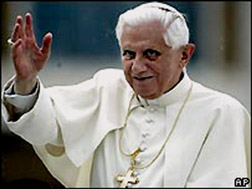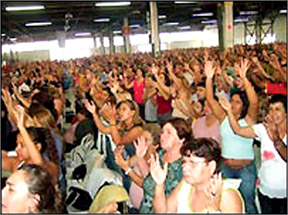Catholic Church tested in Brazil
|

The Pope - or Papa Bento - is due in Sao Paulo this week |
The man on stage is sweating profusely as he leads the crowd in song
- a microphone clutched in both hands.
Some 15,000 people are swaying in front of him, their hands raised in
the air.
This is not a pop concert, but a Catholic mass in Sao Paulo, Brazil,
celebrated by the country's best-known priest, known to everyone as
Padre Marcelo. The former aerobics teacher turned cleric is now so
popular that his CDs outsell every pop star in the country.
The turnout in a converted factory is encouraging news for the
Catholic Church after a long period of declining numbers. That long term
fall coincides with growing pressure from Brazil's Pentecostal churches,
which have been expanding rapidly.
The Pentecostal churches, referred to here under the umbrella title
of 'evangelicals' - which includes other Protestant churches - are a
powerful force in Brazil, with growing media empires, significant
political representation, and more than 24 million followers.
Catholic concern
 Brazil
still enjoys the position as the largest Catholic country in the world,
with some 125 million followers recorded in 2000. Brazil
still enjoys the position as the largest Catholic country in the world,
with some 125 million followers recorded in 2000.
But according to the US Pew Forum on Religion and Public life,
successive Brazilian censuses show the Catholic share of the population
decreased by 4.1% in the 20 years from 1960 to 1980, and dropped almost
three times as much in the next 20 years.
By contrast, the number of Protestants increased by 2.6% between 1960
and 1980, but more than tripled the rate of increase in the following 20
years.
In a sense, Padre Marcelo's 'charismatic' style masses have shown
that one form of response from the Catholic Church to this growing
challenge has been to imitate at least some of the spontaneous style of
the Pentecostal services.
Church leaders concede that Pope Benedict, who is due to in Sao Paulo
this week, is uneasy about the downward trend in Catholic numbers in
Latin America.
"Worried is not the word, but he is concerned," Dom Odilo Scherer,
Sao Paulo's new archbishop, told the BBC News website.
"I think there is no bishop or pastor in the church who is not
concerned. We are not very present in the large cities. One priest is
not sufficient for 100,000 people."
By contrast, it seems almost as soon as a new district emerged in
Brazil's sprawling cities a new evangelical temple or church soon
followed.
For the poor who moved to the cities, these churches provided a
ready-made social network.
This [evangelical] world is full of possibilities, of work, of
getting to know people, of marriage. In this sense they are more
connected to a social group, and they can fit in to the city life
Professor Paula Monteiro, Sao Paulo university
"They arrived here totally lost," says Professor Paula Monteiro, of
Sao Paulo university. "And when they get into their little churches they
start building a network, creating a world within which they can operate
in the city.
Finding new words
"This world is full of possibilities, of work, of getting to know
people, of marriage. In this sense they are more connected to a social
group, and they can fit in to the city life."
The churches appear to have been particularly adept at helping many
people deal with the day-to-day problems of life such as excessive
drinking or drug abuse.
In a developing country like Brazil their emphasis on
self-improvement and success in this life has also gone down well.
Leonardo Boff, a former priest and Brazil's best-known voice of
Liberation Theology, says the Catholic Church must share take
responsibility for the decline in numbers.
"I believe the fault is that of the Catholic Church itself, and the
rigid dogma and inability to create a new language," he says.
"So many people leave and look for other churches, which have more
populist language, and they are more welcoming and they allow for a
sacred experience, an experience of God which is easier and more
immediate."
Boff was once silenced for a year by the then Cardinal Ratzinger,
now, of course, Pope Benedict, so his views may not cut much ice in
Rome. Even scandal, it seems, has not prevented the newest evangelical
pentecostal churches from growing at an impressive rate.
Over the years controversy has surrounded their relentless
fundraising, often among the poorest of Brazilian society, and there
have been damaging images of some church leaders on their knees counting
money a little too gleefully.
In a hugely controversial incident, Pentecostal minister was seen
late at night on TV kicking a statue of Brazil's national saint.
Two founders of one church, Renascer em Cristo or Reborn in Christ,
were recently arrested in the United States accused of smuggling
thousands of dollars into the country, some of which was said to have
been concealed inside a Bible. They deny any wrongdoing.
Changing times
The Catholic Church may take some comfort from a new study of
government statistics by the Getulio Vargas Foundation, which suggests
that this decline is stabilising, but the full picture will not be clear
until the next census.
And Church leaders will be hoping that the visit by the Pope, during
which he will canonise the first Brazilian-born saint, Frei Galvao, will
give a boost to morale.
The Pope may have other pressing issues on his mind when he visits
Brazil. The health minister here has recently said he would like to see
a wide-ranging debate on the issue of abortion - currently permitted
only in limited circumstances - a suggestion that has already prompted a
vigorous response from senior clergy.
Opinion polls suggest the vast majority of Brazilians do not endorse
the teachings of the Church on birth control, and a wider discussion is
under-way about the ethics of stem cell research using embryos.
In one of his engagements the Pope will speak to thousands of young
people in a football stadium. Their future, and the future of the church
in the world's largest Catholic country will be weighing on his mind.
BBC NEWS
|
